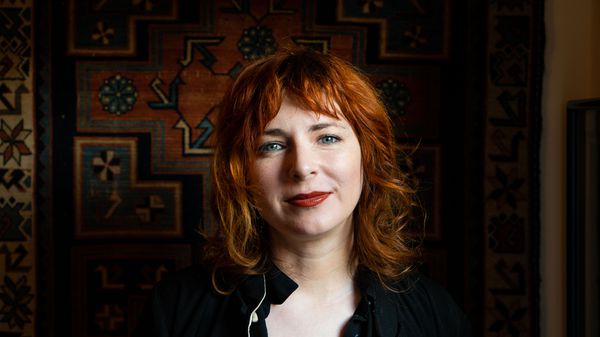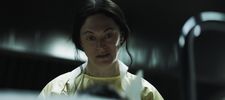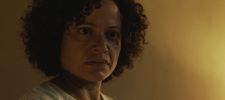 |
| Laura Moss Photo: Courtesy of IFC Films. |
A doctor, Rose (Marin Ireland), obsessed with the notion of curing death. A mother, Celie (Judy Reyes) whose experience as a nurse gives her a unique insight into what it takes to keep somebody alive. Her little girl, Lila (AJ Lister), struck down by an acute attack of viral meningitis. Birth/Rebirth is a modern reworking of long established themes which is told with the plainness and the pragmatism and sometimes the humour that one actually finds in the healthcare profession. It began, unsurprisingly, with an interest in Frankenstein, as director Laura Moss explained to me.
“ I've been obsessed with the Frankenstein story since I read it in school as a teenager,” they say. “I think particularly, I was interested that this was written by a woman, and such a young woman. I learned about more about Mary Shelley and her miscarriages, the major grief that she experienced pretty early in life. And upon rereading Frankenstein, I always pictured Victor as a young woman and wondered what it would mean to have a character who wanted to create life with their mind, but had maybe the ability to gestate the materials she needed for experiments.
 |
| Marin Ireland as Rose Photo: Courtesy of Shudder. An IFC Films release |
“Somatically that felt very rich. And then as we were developing and shooting the movie, I was in my late thirties and early forties, and it felt to me like everyone in my life was dealing with issues of reproduction, either having children, ultimately deciding not to have children, undergoing IVF, having the decision kind of made for them by their bodies. And so infusing this story with all aspects of birthing experiences, and different ways of approaching motherhood and legacy, felt really natural, like a natural fusion with the Frankenstein story.”
There’s a wonderful early scene in a bar in which Rose peremptorily acquires a man for the brief, practical business which must be done before the aforementioned gestation can occur. it’s a scene which is practically devoid of conventional eroticism, and yet, I suggest, Rose’s attitude makes it sexy in a different way.
They nod. “I think hyper-competence is sexy. And I think intensity and drive is really sexy, so I would agree that Rose is kind of a sexy character. But I always thought of Rose as asexual. The milking of the man in the bar, so to speak, is just a means to an end. It was a fun thing to shoot, and I do want to give a special shout out to Bryant Carroll, the actor, who is not only a gentle, kind human being, but was really game for this bizarre experience.”
Given what she’s doing with her body, poor Rose must be up and down on hormones all the time, I note.
“I think she's definitely someone who thinks of her body like a car, like a vehicle, you know? It's like, you should take very good care of it, but she's not really interested in negotiating with it emotionally. It does seem like she's one of those people that really keeps her peas and carrots separate. She wants to control virtually everything.
“That's what actually was really fun about introducing both the character of Celie and a child into that situation, because it necessarily forces you to give up control, which for me, as somebody who's not a parent, I think that's one of the scariest elements of motherhood that, when I look at it from the outside. You're giving up so much control, not just of your life, but also you have so much love and investment in this other person who ultimately you can't control, you can't even necessarily keep safe 100% of the time. That's horrifying to me”.
Each woman has her own relationship with the idea of creating life but they also have a really complicated relationship with one another. How did Laura handle that at the casting stage and work with them to get what was needed?
 |
| Judy Reyes as Celie Photo: Courtesy of IFC Films. An IFC Films Release. |
“I was lucky,” they say. “I didn't have the opportunity to do any chemistry reads or anything like that. But it just turned out that not only did Marin and Judy really get along, personally, but they have this electric chemistry. So that feels like pure luck. I mean, they're also really brilliantly talented actors, so they might be able to manufacture that, but they didn't have to.
“This is such an intense situation, and these women are thrown and forced together, but I was interested in the ways – that might not be initially readily apparent – that they're similar. That is something that Judy, Marin and I talked about a lot. What did these women have in common, and where do they start to sort of see the humanity in each other? Because they really do begin as adversaries.
“It was a fun process to explore. Like every director, probably, I wish that I could have shot in order, and we certainly didn't. But we did a lot of table work in advance, really mapping the journeys of these characters, and making sure they knew where they were at emotionally at all times.”
It’s interesting because they both work in healthcare but Rose is a doctor and Celie is a nurse, which gives them very different perspectives.
“And Rose isn't just a doctor, she's a pathologist,” Laura adds. “She's really not patient facing. I think she likely chose that profession because she's not comfortable with a lot of human patients. It's interesting to me, there's also this intersection of white supremacy and classism that is an undercurrent in the film. I often hear this from friends in the medical profession, that there's this real attitude amongst doctors that nurses are inferior, and their expertise is not valued, or it's valued as soft skills. I really wanted to highlight that in this experiment, when you're trying to keep a child alive, Celie’s expertise is as valuable as Rose’s. They're both necessary elements in moving this forward, in a way that I think Rose herself was completely unable to predict.”
I explain that I had been going to ask if race was a consideration during or before casting, because the idea of a white woman experimenting on a Black child has a lot of additional connotations.
“I'm not trying to make a specific statement about race,” they say. “As I'm a native New Yorker, I’m frustrated very often with whitewashed versions of New York that I see onscreen. For me, setting is really important. That's true in all of my films. The place tends to really be a character. We were talking about setting this in the Bronx. As a white person, I don't want to appropriate someone else's experience, but I don't want to write all-white environments, just because I'm white. I think that perpetuates another problem.
 |
| AJ Lister as Lila Photo: Courtesy of Shudder. An IFC release. |
“It was about doing a lot of research, thinking about the racism inherent in our medical system and the effects of that, but also really collaborating at the development level with Judy and with the other actors of colour in our movie, making sure that I was open to and able to alter the script and the circumstances based on their feedback, and they were incredibly collaborative. Judy was incredible so I really lucked out in that regard.”
There’s a really impressive performance in there from young AJ, who has some very challenging work to do for such a young actor.
“It's really hard. You know, AJ was six when we shot this. I worked a lot with her and her mother Stephanie, who was instrumental in helping shape that performance, especially because we didn't have very much rehearsal time in advance. She was living in a different state and I was sending her videos of toddlers learning to walk, because what AJ really had to do was regress and think about the physicality of someone much, much younger than her. And she was able to do it. I mean, she's a natural, so I feel like incredibly lucky to have her and her mom. Whenever you're casting a kid, you're also casting the parents, and AJ's mom was a real killer asset for us.”
Did she understand the context of what she was doing? Or just that she'd been given a particular instruction at a particular time?
“I talked to Stephanie a lot about this because I wanted to make sure that we were speaking with AJ about it the right way. Her mother had access to the full script before the audition, but I doubt she read the script. So we were talking about that and I was asking Stephanie ‘Does she know that she died?’ I really followed her mom’s lead. Stephanie was like, ‘She absolutely knows. She can't wait to get into a body bag.” They laugh.
“I was like, ‘Okay.’ But you know, you have to be conscientious with a child on set. She was sensitive, you know? She would get a little sensitive about make-up. She got a little anxious when adults were yelling – actors – no-one was yelling on set. It was funny that the things that I thought might trouble her didn't, and then I had to be really sensitive and listen and and make sure that I was receptive to what did actually unsettle her.”
As well as a child, the production involved an animal.
“I know! I swear to God, every day on set I was like, ‘Who wrote this movie?’ We had a pig for three days, Muriel, and she was great as far as pigs go, but she was very food motivated and sometimes a bit obstinate. Originally when I conceived this, I had thought of a teacup pig, like tiny.” They hold up their hands to indicate an animal the size of the average house cat. “And and it wasn't until pre-production that I learned that teacup pigs don't really exist. They're just baby pigs. And then they become big pigs. Every once in a while you get a runt who happens not to grow, but it's very rare. The babies won't take direction and so our pig, at 45 pounds, was the smallest pig that we could find, and was much bigger than we anticipated. So getting her into this apartment, up in the elevator, it was a whole thing.”
 |
| Muriel the pig Photo: Courtesy of IFC Films. An IFC Films Release. |
What was it like shooting in a small apartment and how did they make that work?
“I come from a production design background,” they explain, “so originally I really wanted this to be a build, I wanted us to be able to design this space to reflect the psychology of these characters, I had a very specific layout in mind. And, you know, predictably, we couldn't afford to build the space out. My production designers are Courtney Andujar and Hillary Andujar They are fabulous, and they were able to basically create what I envisioned in a co-op apartment in Fort Lee, New Jersey. So I really credit them and Chananun Chotrungroj, my DP, for creating a space where every angle seems new.
“I hope that when you watch this, you don't realise how much of the film takes place in one single apartment. I really think they created an environment where it doesn't feel that way. But we were shooting between that apartment and a hospital in East Orange, New Jersey, a non working hospital that was retrofitted as a Covid overflow centre that was never used. So we had that freedom, because if anyone's ever shot in hospital, you know, it really is a challenge, and we were able to circumvent that.”
The film has had a great run on the festival circuit prior to release.
“It's been surreal. It’s been really, really, really exciting. Sundance was terrifying, you know? Just to wonder how it was going to be received. This is a particular film, and it's not for everyone, but I feel like we have certainly reached some people who I hoped to reach.
“It's been really fun travelling regionally with the film – it's been fun to just be able to screen the film and then talk to audiences after, but releasing it on Friday, I mean, that's a dream. As I said, I'm from New York City. We're going to be at the IFC Center on Friday, which is the indie movie theatre where I saw all my favourite midnight movies for the first time, so I'm really excited.”
Birth/Rebirth will be in cinemas from Friday, 18 August.





















